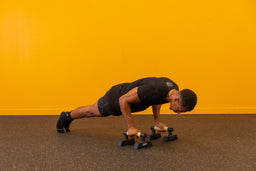
Why New Years Fitness Goals don't work
Why New Years Fitness Goals don't work
Challenge yourself to step away from goal setting this year and focus on building steady habits that will last in the long term.
January is traditionally a time for ambitious goal setting sessions, but it feels like the tide is changing. This year, there’s a lot more talk of habit changes and lifestyle audits instead of 6-week transformation style goals.
The fact is New Year goal setting doesn’t work for everyone. Focusing on habits has a much higher success rate. Let’s look at alternative ways to make progress without the pressure of rigid rules.
Goal setting vs habit formation for New Year
Goal setting is popular for a reason. It’s exciting, motivating, and fits perfectly with the New Year vibes after the Christmas excess. But setting goals can backfire, leaving you feeling frustrated, and further away from your target than ever.
And even if you do reach your goals, what happens then? Goals by definition have an expiry date. We are rarely encouraged to think about life beyond the finish line.
Habits are the building blocks of lasting change, which is why habit-based goals can be a great midway point between traditional goal setting and lifestyle changes. Is it time to shift our focus from wow-factor goals to the gentler process of building habits that will embed real change?
Why is goal setting problematic for health and fitness
Listen, we’re not saying there’s anything wrong with setting goals. Without goal setting, nobody would ever enter marathons or launch their dream business. But we’re saying that those big, scary goals aren’t always the most suitable motivation tool.
Maybe laser-focused fitness goals were right for you in your 20s, and maybe they’ll be right for you again in a future period of your life. But maybe you’re feeling the call of steadier, habit-based change. And there’s nothing wrong with that either.
The main problem with always setting ambitious fitness, fat loss, or nutrition goals is that you may set the bar too high. You need a great plan, good support, the right resources, and often a little bit of luck to achieve really big goals. If it doesn’t happen, you run the risk of losing your motivation to make any progress.
Habit based change is less demanding, and rewards you for small changes done consistently over time. It might be less impressive and less sexy, but it could be life-changing.
What should you focus on instead of fitness goals
Rather than setting yourself yet another set of traditional New Year's resolutions, consider breaking things down into habits. Habits become a part of your lifestyle, making it more likely that you'll stick with them in the long run. And who knows, maybe embedding new habits could get you closer to those once-in-a-lifetime goals in the long run!
4 benefits of building healthy lifestyle habits
- Lifelong change: building habits rather than hitting goals can impact your life in the long term. When you consistently make healthy choices, they become second nature.
- Stealth mode success: goal setting is typically a big deal with more risk attached, but habit change leads to quieter, more predictable success.
- Mental wellbeing: setting yourself habit goals and sticking to them can give you a sense of control and stability that allows you to trust yourself.
- Moving the needle: habit-based goals push your baseline fitness, health, body composition, and nutrition choices higher, so you’ll be in a better position for any future goals.
What are some good examples of health and fitness habits
Focusing on habits, not goals, is a great way to create a solid foundation for your long-term fitness or nutrition journey. But what does that actually look like? Here are 10 examples of habit-style targets you could set yourself this January (or any time).
1 Get outside for a walk every day (minimum 10 minutes)
2 Train 2 x a week and aim for quality sessions
3 Be in bed by a certain time (to give you 8+ hours sleep)
4 Start leaving your phone downstairs when you go to bed
5 Journal in some capacity 3 x a week
6 Get 60 minutes cardio in throughout the week
7 Make 80% of your meals at home from scratch
8 Drink a glass of water every morning before you have coffee
9 5 minutes stretching between dinner and bed 4 x a week
10 Eat 2+ vegetables with every lunch and dinner
Is it time to challenge yourself to not challenge yourself?
How’s this for a challenge. If you’re used to the adrenaline-filled thrill of setting big fitness goals for the year ahead, challenge yourself to not challenge yourself. Instead, let the challenge be small, steady habit-based change that will accumulate over the year. Who’s up for it?






